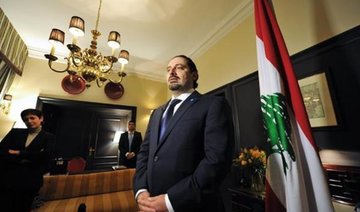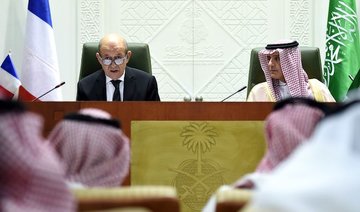BEIRUT: The political anxiety that Lebanon has been through after the resignation of Prime Minister Saad Hariri in Riyadh and his stay in the Saudi capital has become anticipation for his return to Beirut.
A proposed French solution to the crisis may have helped the political dialogue in Lebanon change from discussion of the justifications Hariri gave in his resignation statement to a focus on the way they were presented, which led to tension in the relations between Saudi Arabia and Lebanon.
President Michel Aoun expressed hope that “Hariri’s acceptance of French President Macron’s invitation to visit Paris with his family would constitute a gateway for (finding) a solution to the crisis, which was caused by Hariri’s announcement of his resignation from Riyadh, with all the ambiguity that has caused about his situation.”
Aoun added, “Prime Minister Hariri accepted the invitation of Macron."
President Aoun said that he would “wait for Hariri’s return to Beirut to discuss with him the issue of resignation, which hasn’t been accepted up to now, and when he comes he’ll decide whether he still wants to resign or resume his position as prime minister. The resignation must be presented in Lebanon, and he has to stay in Lebanon until a new government is formed, because a caretaker prime minister is supposed to be in Lebanon.”
Elias Bou Saab, President Aoun’s adviser for international affairs, said that the president’s statements on Wednesday were not meant to escalate the situation with Saudi Arabia but to get it back to "dialogue and communication.” He stressed that relations between Lebanon and Saudi Arabia “have not reached the point of no-return.”
Likaa Al-Joumhouria (Forum of the Republic), under the leadership of former President Michel Suleiman, called for “calm on the Saudi-Lebanon line, and for waiting for the return of Hariri to avoid raising tension between the two brotherly countries.” The forum hoped that the causes that forced Hariri into this situation would be “dealt with in a way that would guarantee the neutrality of Lebanon away from conflicts.”
Sheikh Abdul Latif Derian, the grand mufti of Lebanon, said that “the relationship between Lebanon and the Kingdom of Saudi Arabia has been strong and deeply rooted since the independence of Lebanon, and it should be preserved, maintained and fortified, no matter what conditions Lebanon may experience. Lebanon needs the help of its Arab brethren, primarily Saudi Arabia, to solve the crisis it has been going through following the resignation of Prime Minister Saad Hariri, and to review the causes of the resignation."
Mustapha Allouch, member of the Politburo of the Future Movement, said in a statement to Al-Markazia news agency that “a superficial treatment of the crisis would not contribute to the solution but rather lead to repercussions complicating the situation even further.” Allouch said that “the return of Hariri is certainly linked to specific understandings between the Kingdom and European countries.”
Allouch said that the meeting of Arab foreign ministers on Sunday would “form a landmark event for Lebanon,” and stressed that the Lebanese foreign minister “should have a clear and frank position with the Arab consensus, which believes in the Lebanese interest and protects it from the repercussions of the huge tempest blowing through the region.”
He said that Lebanon should “stress its support for the Kingdom against Iranian aggression, not just adopt a self-distancing policy, but the insistence of the [Hezbollah] party on its policies means the continuation of the problem.”




























